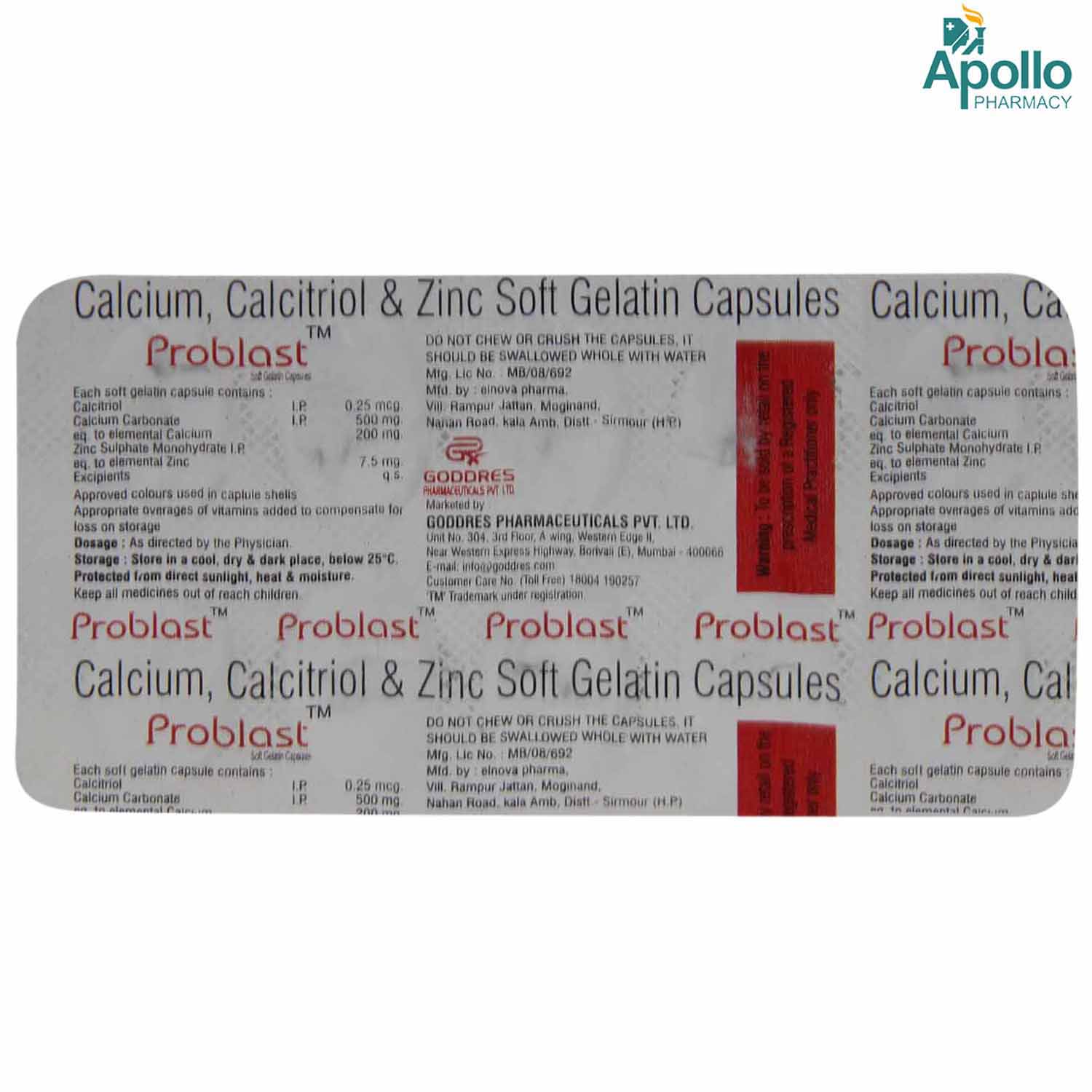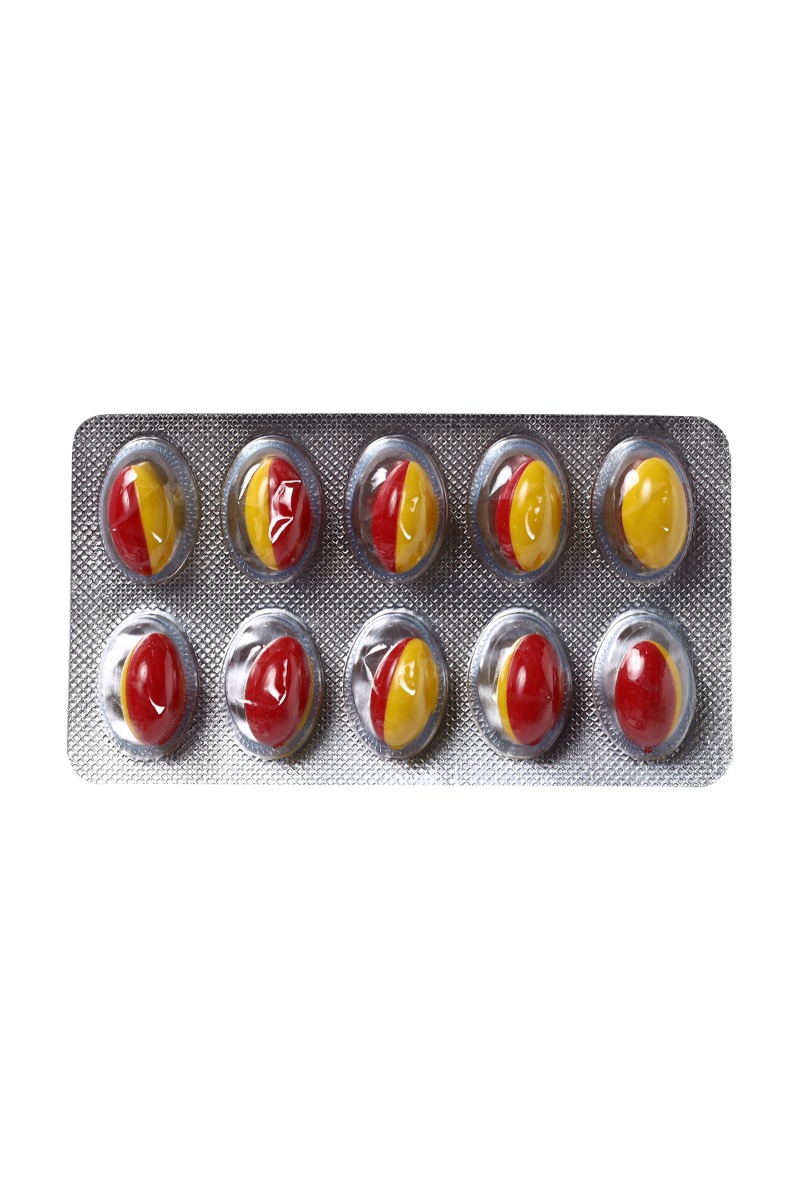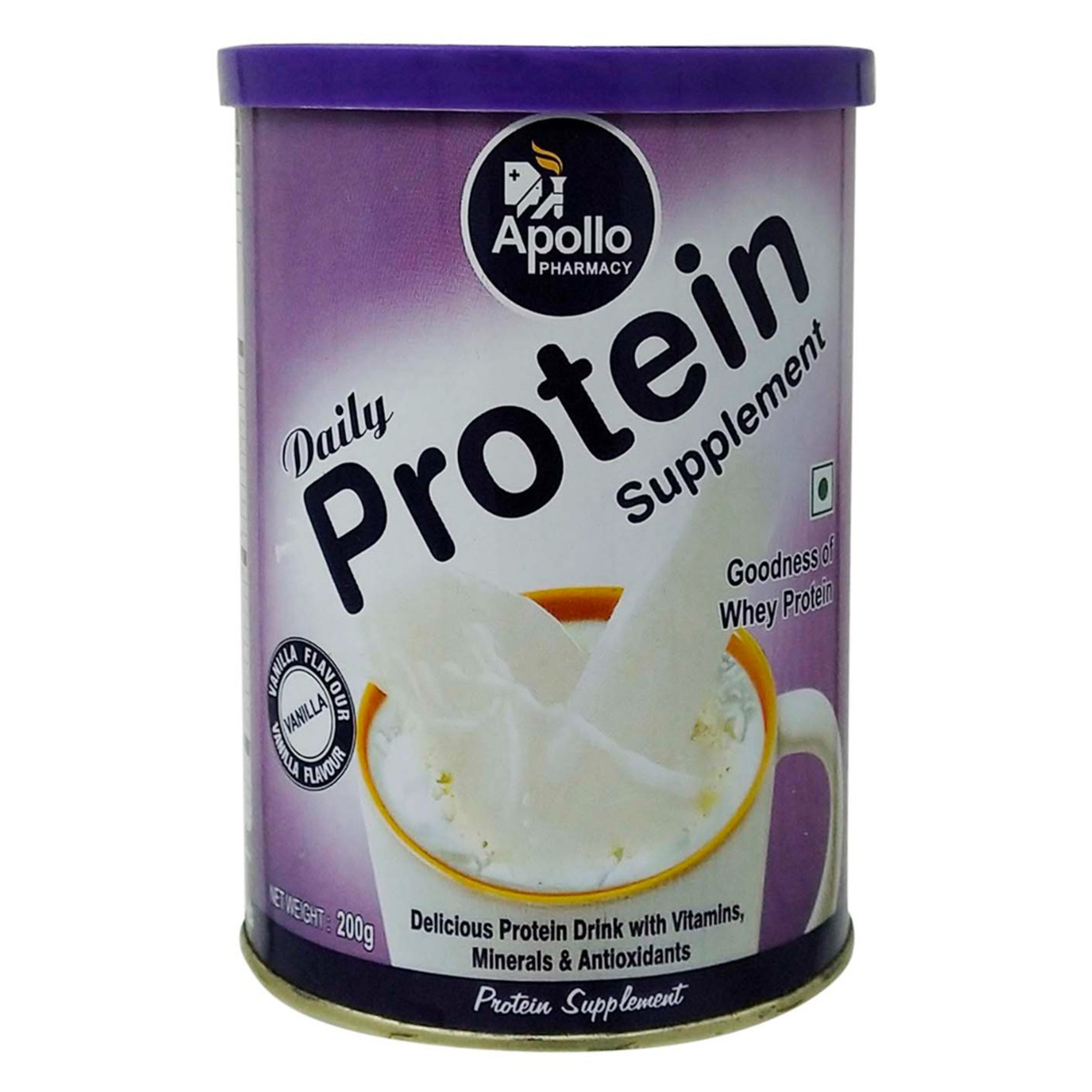Problast Capsule
MRP ₹161
(Inclusive of all Taxes)
₹24.1 Cashback (15%)




Available Offers
Therapeutic Class
Drug-Drug Interactions Checker List
- ESTRAMUSTINE
- CHOLESTYRAMINE
- DIGITALIS
- CIPROFLOXACIN
- LEVOFLOXACIN
- GATIFLOXACIN
- SPARFLOXACIN
- OFLOXACIN
- KETOCONAZOLE
Drug-Drug Interactions
Drug-Drug Interactions
Login/Sign Up
Co-administration of Problast Capsule with Dihydrotachysterol can increase the risk of adverse effects.
How to manage the interaction:
Co-administration of Dihydrotachysterol with Problast Capsule can possibly result in an interaction, but it can be taken if your doctor has advised it. If you notice any of these symptoms - irregular heartbeat, seizures, weakness, tiredness, headache, dizziness, ringing in the ears, loss of appetite, feeling sick, throwing up, constipation, dry mouth, strange taste in your mouth, muscle or bone pain, trouble coordinating movements, weak muscles, peeing a lot, feeling very thirsty, losing weight, eye infection, sensitivity to light, itching, or a higher body temperature - make sure to call a doctor right away. Do not discontinue any medications without consulting a doctor.
Co-administration of Problast Capsule with Digitoxin may increase the risk or severity of digitoxin toxicity and irregular heart rhythm.
How to manage the interaction:
Although there is an interaction, Problast Capsule can be taken with Digitoxin if prescribed by the doctor. Consult the prescriber if you experience symptoms that could indicate high blood calcium, such as weakness, fatigue, headache, dizziness, drowsiness, ringing in the ears, loss of appetite, nausea, vomiting, constipation, dry mouth, a metallic taste in the mouth, bone or muscle pain, incoordination, frequent urination, and weight loss. Also, seek medical attention if you experience symptoms of digitoxin toxicity, such as blurred vision, slow pulse, or irregular heartbeats. Do not discontinue the medication without consulting a doctor.
Co-administration of Paricalcitol and Problast Capsule are forms of vitamin D, and taking too much vitamin D may lead to toxic effects related to excessive calcium levels in the blood and urine.
How to manage the interaction:
Concomitant use of Paricalcitol with Problast Capsule can lead to an interaction, it can be taken if advised by a doctor. Consult the prescriber if you experience symptoms of vitamin D intoxication such as weakness, fatigue, headache, vertigo, drowsiness, ringing in the ears, loss of appetite, nausea, vomiting, constipation, dry mouth, metallic taste, muscle pain, bone pain, muscle incoordination, and low muscle tone. Do not discontinue the medication without consulting a doctor.
Co-administration of Isoniazid with Problast Capsule may decrease the effects of Problast Capsule.
How to manage the interaction:
Although there is an interaction, Problast Capsule can be taken with isoniazid if prescribed by the doctor. Do not stop using any medications without talking to a doctor. Do not discontinue the medication without consulting a doctor.
Co-administration of Metolazone with Problast Capsule can cause blood calcium levels to become too high.
How to manage the interaction:
Although there is an interaction, Problast Capsule can be taken with metolazone if prescribed by the doctor. Consult the doctor if you experience symptoms such as dizziness, drowsiness, weakness, lethargy, headache, nausea, vomiting, or seizures. Do not discontinue the medication without consulting a doctor.
Co-administration of Rifapentine with Problast Capsule may decrease the effects of Problast Capsule.
How to manage the interaction:
Although there is an interaction, Problast Capsule can be taken with Rifapentine if prescribed by the doctor. The doctor may recommend dose adjustment or special tests to use both medicines safely. Do not discontinue the medication without consulting a doctor.
Co-administration of Problast Capsule and Burosumab may cause increases in phosphorus and vitamin D levels in the blood, which may lead to an increased risk of kidney stones.
How to manage the interaction:
There may be a possibility of interaction between Problast Capsule and Burosumab, but it can be taken if prescribed by a doctor. If you have any of these symptoms like kidney stones, it's important to contact a doctor right away. Do not stop using any medications without a doctor's advice. Do not discontinue the medication without consulting a doctor.
Co-administration of Problast Capsule with Carbamazepine may decrease the effects of Problast Capsule.
How to manage the interaction:
Although there is an interaction, Problast Capsule can be taken with Carbamazepine if prescribed by the doctor. However, if you experience any unusual symptoms contact your doctor immediately. Do not stop using any medications without first talking to your doctor.
Co-administration of Amobarbital and Problast Capsule may decrease the effects of Problast Capsule.
How to manage the interaction:
Co-administration of Problast Capsule with Amobarbital can possibly result in an interaction, but it can be taken if a doctor has advised it. If you notice any of these symptoms, it's important to contact a doctor right away. Do not stop using any medications without talking to a doctor.
Co-administration of Cholecalciferol and Problast Capsule are forms of vitamin D, and taking too much vitamin D may lead to toxic effects.
How to manage the interaction:
Although there is a possible interaction between colecalciferol and Problast Capsule, you can take these medicines together if prescribed by your doctor. If you notice any of these symptoms - irregular heartbeat, seizures, weakness, tiredness, headache, dizziness, ringing in the ears, loss of appetite, feeling sick, dry mouth, strange taste in your mouth, muscle or bone pain, thirst, losing weight, eye infection, sensitivity to light, runny nose or itching - contact a doctor right away. Do not discontinue any medications without consulting a doctor.
Drug-Food Interactions
Drug-Food Interactions
Login/Sign Up
Drug-Diseases Interactions
Drug-Diseases Interactions
Login/Sign Up
Drug Warnings
If you are known to be allergic to Problast Capsule or any other medicines, please tell your doctor. If you are pregnant or planning to become pregnant, it is advised to inform your doctor before using Problast Capsule . Higher doses of Vitamin D than the recommended daily dose should be used in pregnant women only when advised by the doctor. Calcitriol in higher doses may harm the fetus. Problast Capsule may pass into the breast milk; hence consult your doctor before taking Problast Capsule if you are a breastfeeding mother. Problast Capsule should be used with caution in children and only if recommended by a doctor. Calcitriol in Problast Capsule can affect growth in children. Inform your doctor if your child is not growing at a normal rate while using Problast Capsule . Problast Capsule is not recommended if you have hypercalcemia (high calcium levels), metastatic calcification (extra deposits of calcium in the body), hypervitaminosis D (high vitamin D levels), and malabsorption syndrome (difficulty absorbing nutrition from food). Inform your doctor before taking Problast Capsule if you have any heart/kidney/liver/blood vessel diseases, kidney stones, sarcoidosis (growth of inflammatory cells in different parts of the body), Crohn's disease (inflammatory bowel disease), Whipple's disease (bacterial infection affecting joints and digestive system), achlorhydria (little or no stomach acid), low levels of bile, and phosphate imbalance. Problast Capsule contains sugar or sorbitol; hence caution should be taken to have an intolerance to sugars, diabetes, and phenylketonuria (increased levels of an amino acid called phenylalanine).
Side Effects of Problast Capsule
- Nausea
- Vomiting
- Headache
- Stomach pain
- Constipation
- Mood changes
- Tiredness/ weakness
- Fast or pounding heartbeat
Directions for Use
Medicinal Benefits Mweb
Key Benefits
Problast Capsule is a combination of three drugs, namely; Calcium carbonate (mineral), Calcitriol (Vitamin D3) and Zinc (mineral) used to treat low blood calcium levels and various associated conditions caused by low calcium levels in the body, such as osteoporosis (weak and brittle bones), osteomalacia/rickets (weak bones), hypoparathyroidism (low levels of parathyroid hormone), and tetany (a muscle disease with low blood calcium levels). Calcium carbonate is a mineral and prevents or treats calcium deficiency. It helps to maintain bone and teeth health. Calcitriol, a synthetic form of Vitamin D3, treats calcium deficiency with hypoparathyroidism (the parathyroid glands' decreased activity) and metabolic bone diseases in people with chronic kidney failure. Zinc is an important mineral in the normal growth and development of the skeletal system. It helps maintain bone density by increasing protein synthetase, which helps protect bone health.
Uses of Problast Capsule
About Problast Capsule
Problast Capsule belongs to the class of ‘Multi-minerals’ primarily used to treat low blood calcium levels. Problast Capsule effectively treats various conditions caused by low calcium levels in the body, such as osteoporosis (weak and brittle bones), osteomalacia/rickets (weak bones), hypoparathyroidism (low levels of parathyroid hormone), and latent tetany (a muscle disease with low blood calcium levels). Problast Capsule can also be given to pregnant, nursing, and postmenopausal women to ensure that they are getting enough calcium. Additionally, Problast Capsule is used to treat hyperparathyroidism (overactive parathyroid glands) and metabolic bone disease in people with chronic kidney disease, surgery, or other conditions.
Problast Capsule consists of three medicines, namely: Calcium carbonate (mineral), Calcitriol (Vitamin D3), and Zinc (mineral). Calcium is a mineral that is used to prevent or treat a calcium deficiency. It provides essential nutrients to maintain bone formation and maintenance. Calcitriol is a synthetic version of Vitamin D3 and treats calcium deficiency with hypoparathyroidism (the parathyroid glands' decreased activity) and metabolic bone diseases in people with chronic kidney failure. It raises Vitamin D levels and thereby increases calcium levels in the blood. This helps in improving the absorption rate of calcium from the intestine. Zinc is a mineral that has an essential role in bone health. Zinc helps to stimulate osteoblastic bone formation and mineralization.
Take Problast Capsule as instructed by your doctor. In some cases, Problast Capsule can cause side effects like constipation or stomach upset, nausea, vomiting, loss of appetite, mood changes, weakness, tiredness, fast or pounding heartbeat, bone/muscle pain, and headache. Most of these side effects of Problast Capsule do not require medical attention and gradually resolve over time. However, if these side effects persist longer, please consult your doctor.
If you are known to be allergic to Problast Capsule or its inactive components, please inform your doctor. Pregnant or breastfeeding women should consult their doctor before taking Problast Capsule . Higher doses of Vitamin D than the recommended daily dose should be used in pregnant women only when advised by the doctor. Problast Capsule may pass into the breast milk. Hence breastfeeding mothers need to seek medical advice before starting Problast Capsule . Problast Capsule may contain sugar or sorbitol; hence caution should be taken to have sugar intolerance, diabetes, and phenylketonuria (increased levels of an amino acid called phenylalanine).
Online payment accepted
know your delivery time
Provide Delivery Location
Therapeutic Class
All Substitutes & Brand Comparisons
RX
Caldikind Capsule 10's
Mankind Pharma Pvt Ltd
₹101
(₹9.09 per unit)
37% CHEAPERRX
Ozocal Capsule 10's
Ozone Pharmaceuticals Ltd
₹118.5
(₹10.67 per unit)
26% CHEAPERRX
Vegacal Capsule 10's
Olamic Pharma Pvt Ltd
₹126.5
(₹11.39 per unit)
21% CHEAPER
- Stay hydrated by drinking plenty of water.
- Avoid dairy product such as cheese, milk, yogurt and ice cream.
- Maintain healthy weight and exercise daily.
- Following a low-calcium diet can help reduce hypercalcemia symptoms.
- Reduce sodium intake to minimize calcium excretion in urine.
- Limit animal protein consumption to decrease urinary calcium levels.
- Increase fluid intake by drinking plenty of water to dilute urine.
- Moderate calcium intake based on individual needs, avoiding drastic restriction.
- Limit oxalate-rich foods like spinach and chocolate to minimize kidney stone formation.
- Stay hydrated by drinking plenty of water.
- Consider reducing vitamin D supplementation if excessive intake is contributing to hypercalciuria.
- Regularly monitor urine calcium levels through 24-hour urine tests.
- Always seek guidance from a healthcare expert prior to implementing substantial changes to your diet or lifestyle routine.
- Drink water or other clear fluids.
- To prevent worsening of pain, limit intake of tea, coffee, or alcohol.
- Include bland foods like rice, toast, crackers, and rice in your diet.
- Avoid lying down immediately after eating as it may cause indigestion or heartburn.
- Avoid acidic and spicy food as it may cause indigestion.
- Inform your doctor about the medication you're taking and the UTI symptoms you're experiencing.
- Your doctor may adjust your medication regimen or consider alternative medications or dosages that may reduce the risk of UTIs.
- Drink plenty of water (at least 8-10 glasses a day) to help flush out bacteria. Avoid sugary drinks and caffeine, which can exacerbate UTI symptoms.
- Urinate when you feel the need rather than holding it in. This can help prevent bacterial growth and reduce the risk of UTIs.
- Consider cranberry supplements: Cranberry supplements may help prevent UTIs by preventing bacterial adhesion.
- Monitor UTI symptoms and report any changes to your doctor.
- If antibiotics are prescribed, take them as directed and complete the full course.

Have a query?
Verified Buyers Reviews
Side Effects
- High Calcium Levels In Blood
- Excessive Calcium In Urine
- Stomach Pain
- Urinary Tract Infection
If any of the above side effects continue or intensify, seek medical advice. Professional guidance may be necessary for appropriate care and treatment adjustments.
Buy best Health & Nutrition products by
Vlado Sky Enterprise Pvt Ltd
Abbott India Ltd
Sun Pharmaceutical Industries Ltd
Apollo Healthco Limited
Zydus Healthcare Ltd
Macleods Pharmaceuticals Ltd
West Coast Pharmaceuticals Pvt Ltd
Intas Pharmaceuticals Ltd
Mankind Pharma Pvt Ltd
Meyer Organics Pvt Ltd
Emcure Pharmaceuticals Ltd
Lupin Ltd
Alkem Laboratories Ltd
Nutritionalab Pvt Ltd
Eris Life Sciences Ltd
Akumentis Healthcare Ltd
British Biologicals
La Renon Healthcare Pvt Ltd
Cipla Ltd
Micro Labs Ltd
Zuventus Healthcare Ltd
Torrent Pharmaceuticals Ltd
Pharmed Ltd
Dr Reddy's Laboratories Ltd
Modi Mundipharma Pvt Ltd
Corona Remedies Pvt Ltd
Hindustan Unilever Ltd
Indchemie Health Specialities Pvt Ltd
Apex Laboratories Pvt Ltd
Koye Pharmaceuticals Pvt Ltd
Leeford Healthcare Ltd
Bioceutics Inc
East West Pharma India Pvt Ltd
Alniche Life Sciences Pvt Ltd
FDC Ltd
Alembic Pharmaceuticals Ltd
Aristo Pharmaceuticals Pvt Ltd
DR Johns Lab Pharma Pvt Ltd
Herbs Nutriproducts Pvt Ltd
Guardian Healthcare Services Pvt Ltd
Vasu Organics Pvt Ltd
Pulse Pharmaceuticals
Fourrts India Laboratories Pvt Ltd
TTK Healthcare Ltd
Raptakos Brett & Co Ltd
USV Pvt Ltd
Glanbia Performance Nutrition India Pvt Ltd
Morepen Laboratories Ltd
Innovcare Life Sciences Pvt Ltd
Linux Laboratories Pvt Ltd
Troikaa Pharmaceuticals Ltd
Cadila Pharmaceuticals Ltd
Bright Lifecare Pvt Ltd
Wockhardt Ltd
Sanofi India Ltd
Primus Remedies Pvt Ltd
Zydus Cadila
Kellogg India Pvt Ltd
Tablets India Ltd
Indoco Remedies Ltd
Medley Pharmaceuticals Ltd
Overseas Health Care Pvt Ltd
Procter & Gamble Health Ltd
Shri Balaji Overseas
Dabur India Ltd
Ordain Health Care Global Pvt Ltd
Systopic Laboratories Pvt Ltd
Ajanta Pharma Ltd
Daris Biocare
Health & Happiness (H&H) Trading India Pvt Ltd
Hexagon Nutrition Pvt Ltd
Nutricia International Pvt Ltd
Zee Laboratories Ltd
Aareen Healthcare Pvt Ltd
Aeronutrix Sports Products Pvt Ltd
Emami Ltd
Radicool Pharmaceuticals Pvt Ltd
Wanbury Ltd
Biovitamins Pvt Ltd
Cadila Healthcare Ltd
Esmatrix Life Sciences Pvt Ltd
Ipca Laboratories Ltd
Klm Laboratories Pvt Ltd
Lloyd Healthcare Pvt Ltd
Sain Medicaments Pvt Ltd
Septalyst Lifesciences Pvt Ltd
Tas Med India Pvt Ltd
Wallace Pharmaceuticals Pvt Ltd
Biorex Healthcare Pvt Ltd
Elbrit Life Sciences Pvt Ltd
Levin Life Sciences Pvt Ltd
Panacea Biotec Ltd
Adret Retail Pvt Ltd
Cipla Health Ltd
Delcure Life Sciences Ltd
Femura Pharmaceuticals Pvt Ltd
Gladstone Pharma India Pvt Ltd
GlaxoSmithKline Consumer Healthcare Ltd
Kepler Healthcare Pvt Ltd
Ronyd Healthcare Pvt Ltd
SPECIALITY SUPPLEMENT
CALCIUM
IRON
VITAMIN D
COLLAGEN
VITAMIN B12
VITAMIN C
FISH OIL OMEGA
VITAMIN B
MULTIVITAMIN
Adult Nutrition Drink
ZINC
SEXUAL HEALTH SUPPLEMENT
WHEY PROTEIN
Kids Nutrition Drink
VITAMIN B9
ENERGY DRINK
SPECIALITY NUTRITION DRINK
DRY FRUIT
HERBAL JUICE
VITAMIN E
Prebiotic & Probiotic
ORS
SUGAR SUBSTITUTE
WOMEN & MOTHER NUTRITION DRINK
Chyawanprash
MAGNESIUM
Protein Bar
BREAKFAST CEREAL
Protein Powder
BIOTIN
DIABETIC NUTRITION DRINK
Honey
WEIGHT LOSS
Fat Burner
PLANT PROTEIN POWDER
VITAMIN B1
Apple Cider Vinegar
MELATONIN
APPETITE STIMULANT
Meal Replacement
Peanut Butter
AMINO ACID
Flax seed Oil
INFUSION TEA
NUT & SEED
Ashwagandha
Instant Food
OATS
Olive Oil
Mass Gainer
Pre Workout
CURCUMIN
POTASSIUM
VITAMIN A
DISKETTE
L-Carnitine
Cod Liver Oil
CREATINE
MILLETS & CEREALS
VITAMIN B6
ARGININE
COENZYME Q10
Shilajit
Appetite Suppressant
Chromium
MILK THISTLE
Glutathione
VITAMIN B2
VITAMIN K
L-Glutamine
MORINGA
GARCINIA CAMBOGIA
GREEN TEA
SPIRULINA
ALPHA-LIPOIC ACID
GLUCOSAMINE
GOKSHURA
BCAA Protein Powder
GILOY
NEEM
SAFFRON
SELENIUM
TRIPHALA
Tulsi
VITAMIN B3
VITAMIN B5
Brahmi
CANDIES
FRUIT JUICE
Face Gel
Specialty Supplements
WEIGHT GAINER
WHEAT GRASS POWDER
Customers Also Bought
Frequently Bought Together
₹256.1
MRP ₹284.5
10% off
1
+₹199.4
MRP ₹221.5
10% off
1
+










